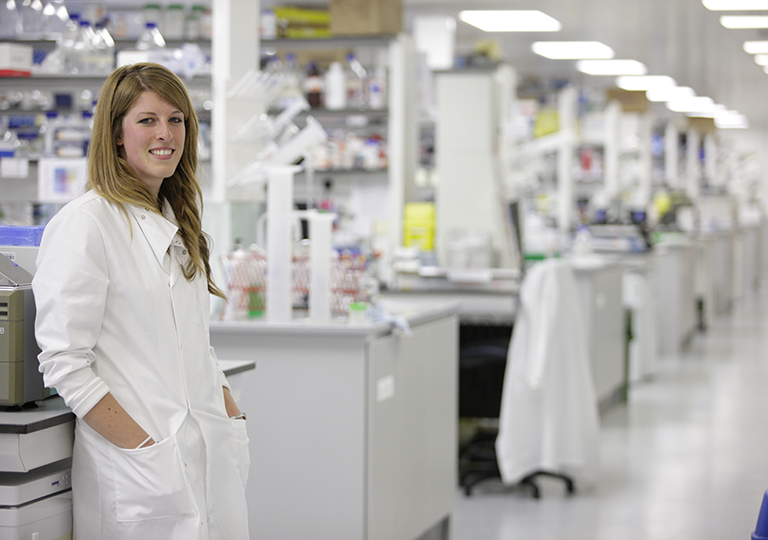Throughout the years, donor-funded PhD students have played a fundamental role in Manchester’s ground-breaking research.
Find out how donors give PhD students the opportunity to play a key role in ground-breaking research. Share on X From Annette over a decade ago to current student Michael, donors have provided crucial support to talented researchers for many years. Read Annette and Michael's story. Share on X 'It helped me to achieve things I didn’t think I’d be able to.' Donor-funded PhD scholarships have enabled talented researchers to make breakthrough discoveries for over a decade. Share on XThe University of Manchester’s research solves real-world problems. From providing clean water for more of the developing world to finding better ways to treat the coronavirus, researchers at Manchester help us to look to the future with hope and optimism.
Crucial to this research and behind every discovery are PhD students. They are some of the most talented people in their field and can make a decisive difference to research outcomes.
Many of the PhD students crucial to building Manchester’s capacity in research are supported by the donor community. Without support from generous donors, many great ideas would go unexplored – and scientific progress would be much slower.
“It represents a very promising avenue of research“

“This wouldn’t have been possible without the support of my donors.”
Michael Haycox is in the second year of his PhD project, focussing on Alzheimer’s disease and identifying new drug targets for a disease which currently has no effective treatments.
“I have had a desire to help fight Alzheimer’s disease since I was young. My family has been personally affected by Alzheimer’s, so I understand the huge impact the disease has, not only on the individual but also on their family.”
The primary cause of Alzheimer’s disease is believed to be a protein called amyloid-beta which amasses in the brain of Alzheimer’s patients and damages neurons, leading to cognitive problems such as memory loss.
“Many clinical trials have targeted amyloid-beta itself, but none have been successful”, Michael says. “However, a protein called soluble amyloid precursor protein alpha (sAPPα) has been shown to increase the resistance of brain cells to toxic levels of amyloid-beta.
“We, as well as other groups, have hypothesised that the sAPPα protein is binding to a receptor on the surface of neurons to cause these beneficial effects. However, nobody has conclusively identified this ‘neuroprotective’ receptor. This is what my project aims to do.”
Michael realises the opportunity he has thanks to his donor-funded scholarship but also the importance of his work as a PhD student.
“Not only is this project of great importance to me personally, but I sincerely believe it represents a very promising avenue of research which, if successful, could open a range of new therapeutic possibilities for Alzheimer’s disease.”
Michael is just one of the many donor-funded PhD students who, throughout the years, have been carrying out crucial research that has real-world impact.
“We could use what we learn from physiology and neuroscience to inform things like technology”

Annette Allen, now a research fellow in Neuroscience at Manchester, received a donor-funded PhD scholarship over a decade ago. But even today she is still well aware of the difference the support made to her.
“The scholarship is what enabled me to do my PhD.
“I wasn’t in a position to self-fund at the time, and it helped me to achieve things I didn’t think I’d be able to, and now do what I think is one of the best jobs to be doing.”
Annette’s research focuses on the human visual system but from a fundamental perspective rather than a clinical one, “looking at the very start of vision and how the retina in our eye encodes the world and what the brain does with that information for us”.
She is now working on a recently-discovered photo receptor; a cell in the retina that responds to light.
“We used to think there were two receptors called rods and cones but now we know there are three. The photo receptor is involved in subconscious responses to light such as controlling our pupil size and synchronising our body clock.”
With artificial light making headlines this year given the ever-increasing amount of screen time we accumulate each day and the potential negative effects of this, Annette’s new knowledge could help to address this.
Her team is making prototype visual displays to put that new knowledge into practice. But she thinks that is just the start when it comes to neuroscience’s impact on technology in the future.
“What I find fascinating is how the brain is capable of doing what it does when it’s so compact and small. If you asked a computer to do something like that, you’d need the world’s biggest supercomputer and it still couldn’t do it.
“It really highlights the complexity of the brain, its processing and how it’s such a dynamic system. We could use what we learn from physiology and neuroscience to inform things like technology.”
Annette’s work is a prime example of the ground-breaking research that takes place at Manchester. And this is not just by chance. The very environment in which researchers are operating lends itself to imagination and collaboration that helps drive new discoveries.
“At Manchester, you can collaborate with all these specialists in all kinds of areas”, says Annette.
“It’s that collaborative approach to research that’s always pushing it forward, allowing you to do things you wouldn’t have planned on. That is what you need to be imaginative.”
.
.
From Annette to now students like Michael, donors have enabled PhD students to play a key role in life-changing research at Manchester.
The generosity of thousands of supporters each year means that talented, young researchers can overcome financial barriers that stand in their way of achieving their true potential, and making a difference in the world.
“For many people a PhD is the first step on that journey and the training and development it gives you is priceless”, says Annette.
“It’s a very generous thing for people to do and it helped me fantastically. It’s been the foundation of the research that I’ve been able to do since then.”
To everyone who has supported innovative, pioneering research at Manchester over the years, and on behalf of beneficiaries like Annette and Michael, we would like to say thank you.

